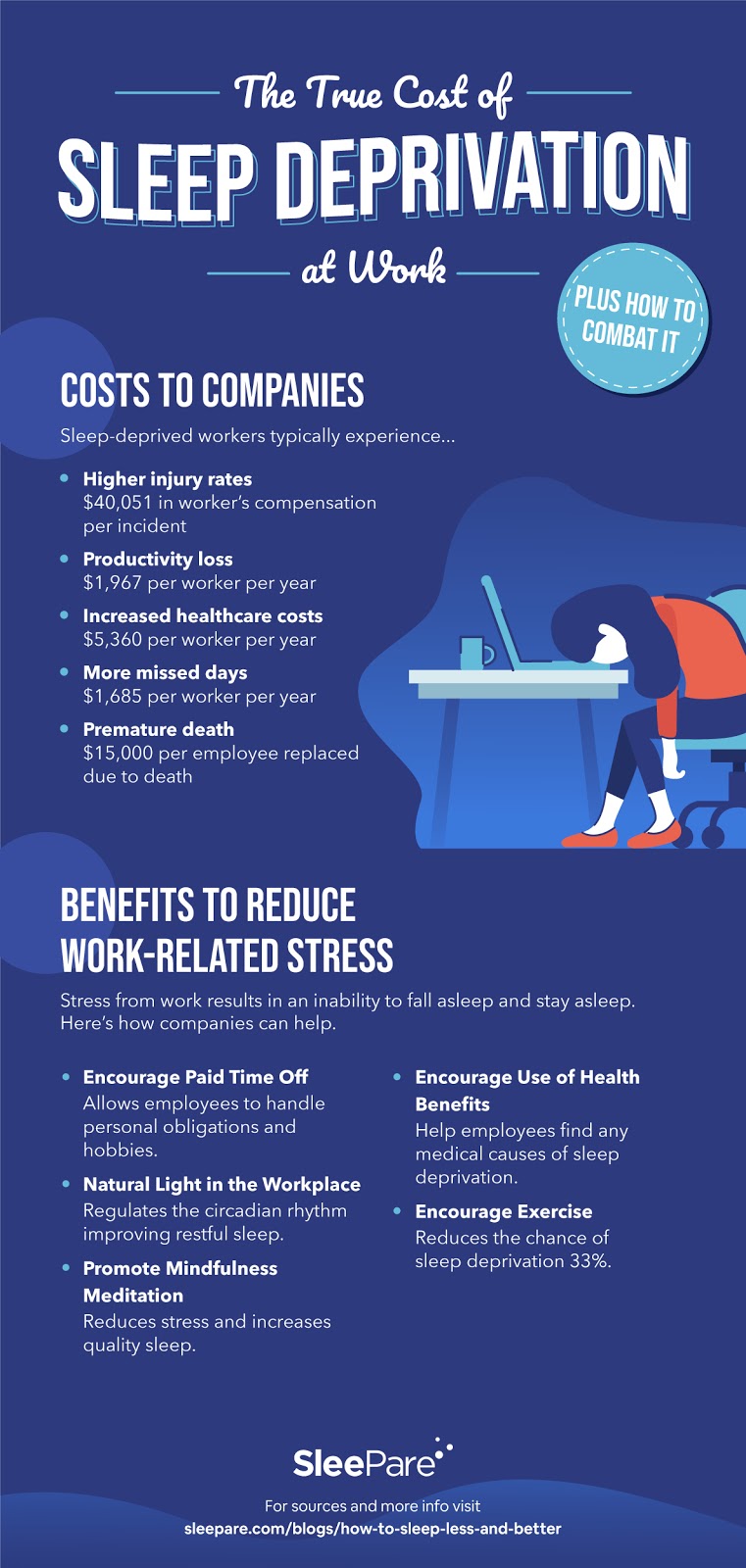Your employees are tired and it’s costing you money. Sleep deprivation is a big problem in the world but there are things your company can do to help improve your employee’s lives so they can feel more rested and relaxed.
Sleep deprivation can occur because of a few different things including, but not limited to, stress and irregular work hours. Your fatigued employees can not only have a tangible effect on your business but also harm their own health and welfare.
What Causes Sleep Deprivation

To fully understand the sleep deprivation problems of your employees, we first need to look at the root causes of sleeplessness itself. We can’t fix a problem if we don’t know how it starts.
1. Voluntary Behavior
One root cause of sleep deprivation is voluntary behavior. This can be choosing to work late because of their own employment goals or staying up late to watch the latest episode of a hot new show.
This cause of sleep deprivation can be the hardest to counteract because the cost-benefit ratio for the employee seems to be in their favor. They think that they’re helping out by working extra hours when in fact, they should have been sleeping at that time.
Alternatively, they think that the entertainment value they receive is a necessary treat after a long work week.
2. Personal Obligations
Sometimes your employee may have no choice but to lose out on sleep because of a personal obligation. These can be anything from a newborn baby, working on a side hustle, caring for a sick family member, or some other responsibility.
It can be hard to know when an employee needs help with managing their personal obligations so that they can be well-rested for work. Look out for employees that look tired, are distractible, or seem anxious.

3. Work Hours
In our global and interconnected world, it is increasingly common for employees to work either long or irregular hours. This can cause employees to miss out on quality sleep by not having a regular sleep schedule or participating in shift work.
Some businesses can’t run without rotating shifts. However, this schedule is not conducive to employees�� restful sleep because they can’t regulate their circadian rhythm with the constant changing of shifts.
4. Medical Problems
Another cause of employee sleep deprivation is medical problems. Your employee could have the best sleep schedule, the best mattress, and work the best hours for sleep and yet still may become sleep deprived because of an underlying medical problem.
Hormonal imbalances, chronic illnesses, depression, or sleep apnea can cause your employees to lose sleep. Medical issues can be difficult to counteract because they are often considered private and employees will likely not talk about them at work.
5. Cause Stress
Stress can inhibit a fully relaxing sleep and because lack of sleep can cause stress it can create a never-ending spiral of sleep deprivation. Stress can occur because of work obligations or personal problems like a high debt burden or problems in your employee’s home.
While there will always be an amount of stress involved with work and personal life, it’s important to notice when your employees are overly stressed. Excessive stress can make employees buckle under the pressure and render them unable to perform even their most basic of job functions.
The Cost of Sleep Deprivation

Having sleep-deprived employees is costing you time and money. Not only can sleep deprivation make your employees less attentive but it can also cause health problems for them if they continue to go without proper sleep.
1. Workplace Accidents
OSHA reports that evening shift accident and injury rates are 18 percent greater than those during the day shift and 30 percent greater during the night shifts. Overall, for employees that work 12 hours or more, the chance of injury is 37 percent higher than those that work a standard eight-hour shift.
A tired worker has diminished capacity. The average cost of a single worker’s compensation claim is $40,051. When your employees are fatigued they are more likely to have an injury at work. This can cost you, as a company, hundreds of thousands of dollars in worker’s compensation claims, not to mention other costs associated with the incident.
2. Lost Productivity
Fatigue can cause employees to make more mistakes and poorer decisions. Sleep deprivation can also cause lower attention spans, longer reaction times, lack of motivation, distractibility, and forgetfulness. All of these add up to a lower job performance from your sleep-deprived worker.
If you have fatigued employees, it could be costing you $1,967 per worker per year. For the entire economy, this adds up to $136 billion dollars a year, $101 billion more than for employees who get the rest they need at night.

3. Diminished Health
When your employees are sleep deprived they often have higher healthcare-related costs. These higher costs are due to the health problems associated with fatigue that are the result of sleep deprivation. These health issues include obesity, diabetes, hypertension, heart disease, and mental health problems.
Additionally, sleep deprivation weakens the immune system. A weak immune system means your employees may get sick more often. All these different fatigue-related health problems add up to $536,000 in additional health costs for a company of 1000 employees.
4. Increased Absences
Workers who get adequate sleep, meaning six hours or more a night, work approximately 4 extra days per year than those that are sleep deprived. It seems like spending an extra hour or two sleeping leads to more work for the employer.
Overall, the costs associated with fatigue-related absenteeism is $1,685 per employee annually. For all US companies, this becomes $225 billion dollars in money lost. If your company can’t work without that employee, the cost becomes higher due to overtime paid to the employee who covers the missed shift.
5. Employee Death
Another problem that comes from employee sleep deprivation is that they are more likely to die sooner than those who get adequate sleep. Mortality rates for people who suffer from fatigue are 40 percent higher than the general population.
The cost of having to replace an employee is approximately one-third of their salary. This means it will cost your company $15,000 to replace a fatigued employee who has died if he made $45,000 a year.
Benefits Employers Can Implement for Better Sleep

The good news is you don’t have to buy each employee a better mattress to help them get a good night’s sleep. You can put some benefits into place to make them feel appreciated, stress less and get quality rest.
1. Encourage Paid Time Off
If you show your employees it is okay to use their paid time off, it will help them stress less. It will also allow them to do things they love without missing out on sleep. Now they can dedicate a whole day to bingeing their favorite show.
Paid time off is already a benefit most employees have so you don’t need to spend anything extra in encouraging its use. Using their paid time off will allow them to catch up on sleep from extended or irregular work hours and lead to a more rested worker who will be more productive in the long run.
2. Natural Light in the Workplace
Replace fluorescent lights with natural lights to boost productivity. It is a relatively cheap and simple fix to help your employees feel more alert. Natural light also helps regulate their natural sleep-wake cycle or circadian rhythm.
Another way to improve employees’ exposure to natural light is to encourage them to spend more of their breaks outside. Research shows that getting at least 10 to 15 minutes of natural sunlight will help your employees sleep better at night.

3. Promote Mindfulness Meditation
Meditation alleviates stress and helps people sleep better at night. One way to encourage meditation is by sending out information to your employees about quick mindfulness meditation methods that can help them get through their day in a better way.
You can also offer voluntary information sessions through your HR Department. You can offer your employees a subscription to meditation apps like Calm or Headspace or offer them free YouTube videos that can help them learn how to meditate away their stress.
4. Encourage Use of Health Benefits
Since many of the causes of sleep deprivation are health-related, it can be helpful to encourage your employees to make use of their health benefits. This can be as easy as having your HR department post infographics and offer brochures about the benefits your health plan provides.
By showing your employees that it is a good idea to visit the doctor, it will give them an opportunity to talk to a medical professional about their sleep problems. This way they are more likely to get the help they need to sleep better and ultimately provide a better output.
5. Encourage Exercise
According to the American Academy of Sleep Medicine, people who exercise regularly were one-third less likely to report sleep problems and half as likely to report feeling tired during the day.
You can encourage exercise in a few different ways. One way is to make it a challenge and offer a benefit (like an extra day off) for the person who exercises the most minutes per month. You can also offer your employees discounted gym memberships of fitness trackers like an Apple Watch as a part of their benefits package.
Sleep is essential for your physical and mental recovery. It has many benefits including increased productivity. However, often sleep deprivation is due to an uncomfortable mattress. Use SleePare’s mattress compare tool to help you find a better sleep today.


 Free delivery across US & Canada
Free delivery across US & Canada Best price guarantee
Best price guarantee Extended 120-day sleep trial
Extended 120-day sleep trial Free in-store mattress testing
Free in-store mattress testing








 Showrooms
Showrooms





Meet The Author:
Shanir Kol
Shanir Kol, founder and CEO of SleePare, pioneered the “Try and Buy” model in eCommerce, enhancing mattress shopping by combining in-store trials with online purchases. Launching in 1999, his company focuses on customer satisfaction and eco-friendly practices, aiming to minimize mattress waste and expand sustainably.